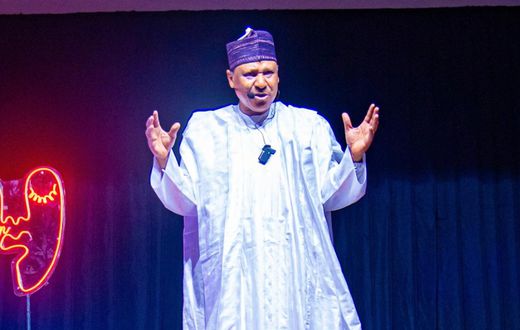Federal Government Reports Falling Inflation as Economic Reforms Take Shape in Nigeria
Nigeria’s ongoing economic transformation under President Bola Tinubu is reportedly producing tangible results as the nation’s inflation rate records a significant decline. The announcement, made at the 2025 ministerial briefing at the National Press Centre in Abuja, highlights recently published data from the National Bureau of Statistics (NBS) that point to early signs of economic recovery for households and businesses across the country.
During the briefing, Minister of Information and National Orientation, Mohammed Idris, emphasized that the federal government’s bold economic decisions are beginning to ease the harshest pressures on citizens. The April Consumer Price Index (CPI) from the NBS confirmed that Nigeria’s headline inflation rate fell to 23.7% in April, compared to 24.23% the previous month—a trend seen as a hopeful marker by both policymakers and economists.
“One of the key indicators of relief is the food inflation rate. While food prices remain an important concern for many Nigerians, the year-on-year food inflation rate has eased to 21.26% in April. On a month-on-month basis, it slowed to 2.06%, down from 2.18% in March,” Idris stated during the address.
![Mohammed Idris, Information and National Orientation Minister. [Twitter:@tswakom2]](https://nowahalazone.com/wp-content/uploads/2025/09/4636a229-5002-4088-a7f3-d60512e6b392-1.jpg)
Mohammed Idris, Information and National Orientation Minister. [Twitter:@tswakom2]
According to Minister Idris, the improvement in key economic indicators has been driven by a series of targeted government interventions. Initiatives in the agriculture sector, reforms in transportation, and support for critical services have all contributed to what officials describe as a measurable reduction in inflationary pressures—particularly those affecting basic household necessities.
Among the mainstays of Nigerian diets—such as maize flour, wheat, yam flour, okra, soya beans, rice, and beans—there have reportedly been price declines, with traders and market analysts expressing cautious optimism. Lagos-based market observer Aisha Bello noted, “We’ve witnessed small but meaningful drops in staple food prices in several major markets, and although it’s not yet enough, it signals a possible turning point for local families.”
Despite these positive developments, officials acknowledge that the road ahead remains tough. Minister Idris was candid about the fact that the government’s economic goals have not yet been fully realized. “We cannot claim to have achieved all we set out to do, but these numbers give us reason to be hopeful for continued progress,” he said.
![A trader waits for costumers while selling grains, legumes and flours in his stall at a market in the Obalende area of Lagos on December 18, 2023. [Getty Images]](https://nowahalazone.com/wp-content/uploads/2025/09/17eaef9a-46b4-42aa-93b1-8fd9e69c1878-1.jpg)
A trader waits for costumers while selling grains, legumes and flours in his stall at a market in the Obalende area of Lagos on December 18, 2023. [Getty Images]
By notably addressing food inflation, which most directly impacts daily life for ordinary Nigerians, the government aims to stabilize living costs and encourage economic confidence at the grassroots level. “They show that hard decisions are beginning to bear fruit,” Idris explained, highlighting expectations of improving consumer purchasing power and a gradual uplift in overall living standards as inflation continues to moderate.
The administration’s approach has focused largely on restructuring policy frameworks across food production, logistics, and small business support. Experts suggest that while these changes inevitably carry short-term discomforts—particularly for vulnerable and low-income communities—steady implementation may help pave the way for long-term prosperity.
However, concerns remain among economic analysts and civil society advocates. Local economist Dr. Chuka Nwankwo pointed out, “Even with the recent dip, Nigeria’s inflation rate remains among the highest in Africa. We must continue to prioritize transparency and ensure that support reaches those who need it most.”
For many trading in major markets across Lagos, Abuja, and Kano, the falling inflation provides a welcome reprieve but—according to interviews conducted with daily market shoppers—the impact must be deepened and sustained over several quarters before trust in policy reforms is fully restored. According to a trader in Balogun market, “Any decrease in prices is appreciated, but we’re watching to see if this will continue or if it’s just temporary.”
Globally, Nigeria’s battle with inflation is not unique. Many economies in West Africa, including Ghana, have grappled with volatile exchange rates, rising import costs, and disruptions to supply chains in recent years. Ghana, for example, saw its inflation rate touch nearly 54% in December 2022 before intensive fiscal measures brought the rate below 25% by early 2024—offering regional lessons in crisis management and recovery.
The Tinubu administration pledges to maintain a people-first agenda, focusing on policies that promote relief and spur inclusive growth. As Minister Idris reaffirmed at the briefing, the commitment is to “implementing people-centred policies that guarantee relief, restore economic stability, and ensure shared prosperity.”
Still, watchdog groups and policy analysts urge vigilant oversight and community engagement throughout the reform process. Civil society organizer Funke Adeola stated, “It’s crucial for citizens to participate actively, report on-the-ground realities, and hold authorities accountable to ensure these policies have the desired effect.”
For millions of Nigerians, the true measure of success will come not just from statistical releases but from the improved ability to afford daily essentials and a sense of renewed hope for a better future. The next quarters will be critical in confirming whether these early gains can be cemented into a pattern of sustainable economic growth.
As the nation moves forward, many are watching to see how the government balances ambitious reforms with the immediate needs of vulnerable populations—and what strategies will be deployed to ensure lasting relief. The conversation around inflation, food security, and economic resilience remains at the heart of national discourse, touching every household from Lagos to Maiduguri and resonating with West African neighbors eager for similar progress.
What’s your take on Nigeria’s recent decline in inflation? Have recent price changes affected your household or business? Share your experiences below, and stay tuned for more expert analysis and local updates on Nigeria’s economic journey!










